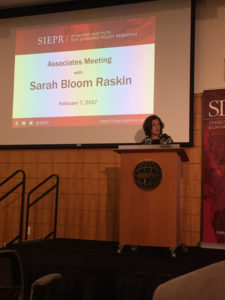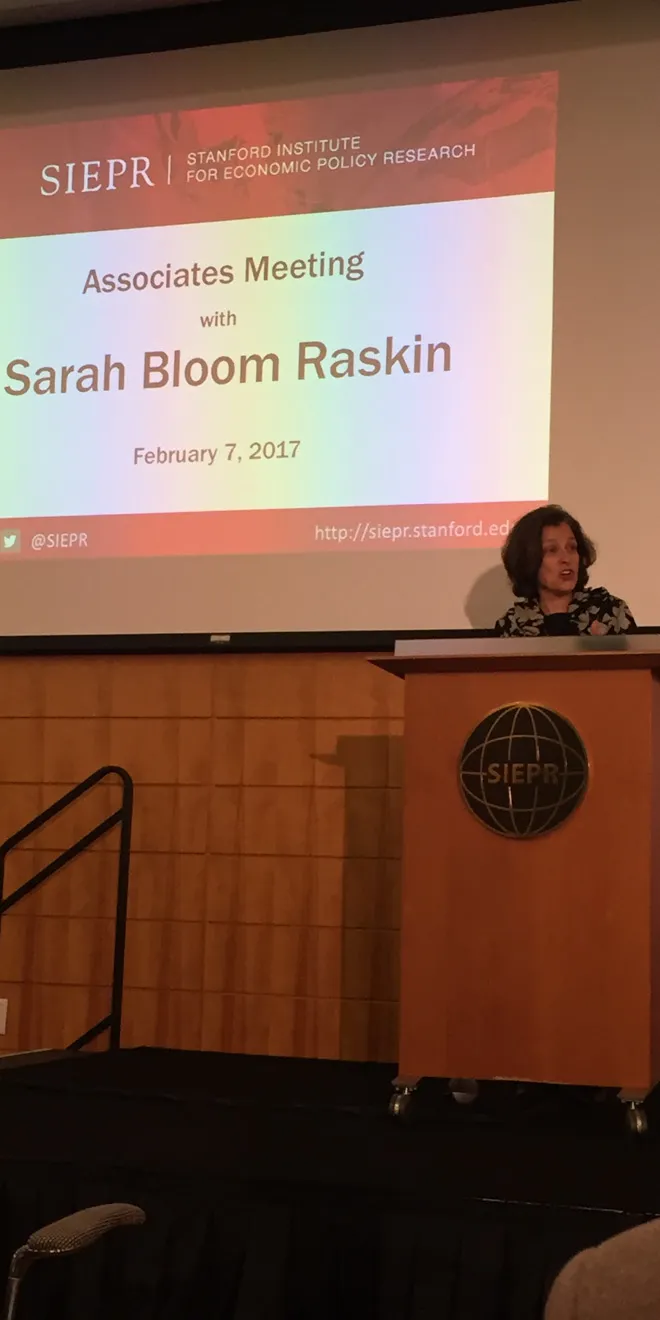Former Deputy Secretary of the Treasury Sarah Bloom Raskin, who served under the Obama administration, shared her views on cyber attacks and financial security in a talk at the Stanford Institute for Economic Policy Research (SIEPR) on Wednesday.
Raskin discussed the nature of the new security challenges that countries face in the digital age and proposed a variety of ideas to overcome these problems, such as the establishment of global cyber security norms similar to international law. The Stanford Daily took the opportunity to interview Raskin about her time at the Treasury and the future of the U.S. economy.

The Stanford Daily (TSD): How do you think your visit here is going to be useful for Stanford students and how would it work to get them involved in the areas of finance and cyber security?
Sarah Bloom Raskin (SR): I think first of all, my talk presents a way in which students can begin to understand cybersecurity from a financial perspective. So I think this topic is of great interest from a policy standpoint, and also because there’s a fair amount of innovation going around here. The ability to innovate should be done with an eye towards creating secure systems.
TSD: Are there any Treasury department initiatives that you feel would be relevant to college students today?
SR: [On the topic of student loans], the cost of education has been going up so fast, and yet it is so important to complete a quality, four-year education. Education is an important indicator of economic progress. It’s hard when students have to finance their education with debt that might be hard to repay.
TSD: What ideas did you come up with to make it easier to deal with student loans?
SR: One idea was to develop a college rating system which included in its disclosures the levels of defaults and delinquencies amongst students of that university. I think that [would be] good for prospective students to see. It makes sense to see if they are going to a school where their degrees are going to give them the income they need to pay off their loans.
Another huge innovation was the development of income-based repayment plans. This is the idea that you can make your student loan payments affordable by paying only a certain percent of your monthly income. Even if you may not be making a lot of money early on in your career, you still are able to pay off your student loans. This program is interesting because if you pay continuously for 20 years, you will have the rest of the loan forgiven. You pay 10 percent of your monthly take-home pay. This scheme, however, [only] applies to federal student loans, not private ones.
One thing that I did in the Treasury that I really enjoyed doing was [that] as I traveled around the country, I met with different groups at different colleges and universities to talk to them and get their impressions on how they understood student loan debts. The aim of this was to educate students about the way student loans work. It’s a complex financial transaction at a young age, one of which there hasn’t been much information about. It’s an opportunity to learn. This plan therefore helps social mobility as well.
TSD: There has been a surge in the use of money transfer apps like Venmo and Apple Pay. What are your views on their ability to secure one’s private details?
SR: A virtue of a lot of these new apps is that they represent innovative ways for people to engage in financial transactions. That’s an excellent goal. They have improved the ability to be financially included in the economy.
TSD: But do you think there have there been sacrifices in terms of security?
SR: I do not want to make a generalization, but I think the innovators understand that when it comes to money, one bad incident could be devastating. When it comes to financial transactions, our system is based on confidence. So I’m sensing that there are plenty of innovators who understand that the tolerance for a security breach is pretty limited.
TSD: Given the current political climate at Washington, do you feel worried about the future of the U.S. economy?
SR: Our economy is on a good trajectory right now. We have a strong growth rate and our unemployment rate is low. One of the risks of solid economic growth and low unemployment rate is the introduction of chaos into our financial system. Having a financial system that is stable is important in communicating confidence. If the financial system gets destabilized, that would be a threat to economic growth. I would be very careful in removing the financial guardrails that were enacted after the financial crisis.
TSD: President Trump has accused China and Germany of manipulating their currencies. Do you feel that there is a legitimacy to the claim that China and Germany are purposely trying to strengthen their economies at the cost of others by depreciating their currency and maintaining current account surpluses?
SR: We have interest in Europe having strong growth from a geopolitical and a stability perspective. Countries’ valuations do affect relative currency valuations between countries which affects the values of imports and exports. One must be careful with their words and therefore, international economic arrangements need to be handled such that we do not start a potential trade war.
TSD: What were some of the major challenges you faced in office? What were some highlights?
SR: The Treasury is a huge place and essentially engages in a lot of operations for the country’s finances. So we raise money [and] maintain the treasury markets as one of the most liquid and deep markets around the world. We also pay the bills and handle all the finances. The overall functioning is something that is critical to our country’s well being. In my experience, the people who engage in that work are some of the best of the people I have ever worked with.
One thing I worked very hard to do was to make sure all perspectives were afforded the opportunity to be expressed in the policy making process. I think when diverse perspectives are offered, you get better results.
Contact Vibhav Mariwala at vibhavm ‘at’ stanford.edu.
